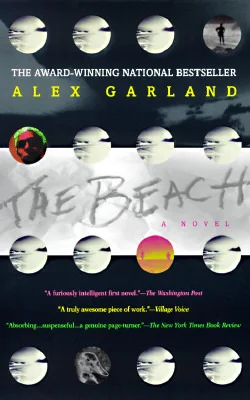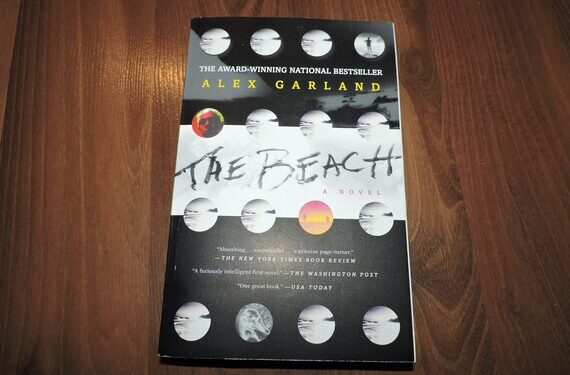Table of Contents
ToggleIntroduction
The Beach Summary And Themes By Alex Garland First released in 1996, Alex Garland’s The Beach is a gripping and provocative book that examines the aspirations, disappointments, and fallout of pursuing a perfect, utopian life. The novel, which is set in Thailand, follows Richard, a young backpacker, as he sets out on a quest that brings him to a remote, hidden beach town.
The Beach Summary And Themes By Alex Garland What starts out as a utopian fantasy eventually turns into a terrifying nightmare filled with danger, obsession, and moral dilemma. The Beach examines the attraction of escape and the sinister aspect of human nature when people look for freedom and perfection outside of socially acceptable bounds.
In addition to tackling the intricacies of self-identity, survival, and the search for meaning, Garland’s book has frequently been characterized as a critique of the contemporary world’s fixation with consumerism and shallow values. The stunning scenery of Thailand and the moral deterioration that befalls people who attempt to flee reality are contrasted sharply by the novel’s gripping narrative and arresting visuals. Fundamentally, The Beach asks readers to think about the price of idealism and if living a completely ideal life is desirable or even feasible.
Plot Summary of The Beach
Richard, a twenty-year-old British traveler, tells the story of The Beach. He is traveling to Thailand. Disillusioned by the tourist attractions and looking for something more genuine, Richard finds a cryptic map that a fellow visitor left behind that claims to lead to a secret beach—an undiscovered paradise unspoiled by mass tourism. The people who live on this secret beach, which is only known to a small number of people, are said to live in a peaceful, self-sufficient community far from the chaos of the outside world.
After being intrigued, Richard embarks on a journey with two other passengers: Françoise, a French woman, and her lover, Jed, a Danish man. They travel to the beach, where they find the remote paradise to be far more perilous and complicated than they had anticipated. A small group of people, primarily young tourists from all over the world, live on the beach and are unencumbered by the limitations of society. But since these people have established their own set of regulations, it becomes evident that their utopian dream is far from ideal.
Richard’s initial excitement about the pristine beauty of the place quickly fades as he realizes the dark undercurrents within the community. There are tensions between the inhabitants, particularly between the group’s leader, Sal, and Richard’s growing unease about the dynamics of the beach.
As Richard becomes more deeply involved with the community, he discovers that the supposedly tranquil paradise is rife with violence, paranoia, and the harsh realities of human nature. The idyllic vision of paradise is tainted by the struggles of the inhabitants to maintain control over their isolated haven, including a thriving but illegal marijuana-growing operation, which is integral to their survival.
Read more
Richard’s own descent into the darker aspects of the beach community mirrors the unraveling of the utopian ideals that initially drew him there. He grapples with his identity, his place in the group, and the increasingly violent and unstable nature of the people around him.
What began as a dream of an idyllic, free life in paradise transforms into a nightmare as Richard finds himself caught up in betrayals, manipulation, and an inevitable spiral toward self-destruction. Over time, Richard becomes less of a detached observer and more of an active participant in the breakdown of the community, leading to the eventual collapse of the dream they had tried to build.

The novel ends on a note of ambiguity, with Richard reflecting on the experience and what he has learned from it. He is left to contemplate the nature of paradise, the consequences of his actions, and the price of seeking escape from the world. In the end, The Beach challenges readers to consider whether a truly perfect life is ever attainable or whether the pursuit of such a life can ultimately lead to destruction and disappointment.
Themes in The Beach
1 The Illusion of Paradise: A central theme in The Beach is the illusion of paradise. Richard’s quest to find a perfect place, away from the pressures and chaos of modern life, leads him to a secluded beach community that at first seems to be a dream come true. However, as the story unfolds, it becomes clear that this “paradise” is not what it appears to be. Garland critiques the idea of an idealized escape from the world, revealing that even the most seemingly perfect places are fraught with conflict, greed, and human flaws. The novel suggests that seeking perfection can be a dangerous pursuit, one that blinds individuals to the complexities and imperfections inherent in any society.
2 Human Nature and the Corruption of Utopian Ideals: The novel explores the tension between idealism and human nature. The inhabitants of the beach community have come together to create a utopia, free from the structures of the outside world.
However, as time passes, their human flaws—greed, jealousy, selfishness, and power struggles—begin to corrupt the very ideals they sought to preserve. The community’s descent into chaos reflects the darker side of human nature and how even the most well-intentioned individuals can be swayed by their desires and instincts. Garland uses this theme to question the feasibility of utopian societies and to show how they inevitably fail due to human imperfection.
3 Escapism and the Desire for Freedom: The Beach is fundamentally about escapism—the desire to escape the constraints of modern life and create a new existence outside of societal norms. Richard’s journey to find the secret beach represents a quest for freedom and adventure, but it also reflects a desire to disconnect from reality. The novel critiques this desire for escape, suggesting that running away from one’s problems or the complexities of the world can lead to dangerous consequences. Garland raises the question of whether true freedom exists or whether the very act of escaping may lead to new, unforeseen limitations and conflicts.
4 Isolation and Alienation: The Beach Summary And Themes By Alex Garland While the beach community is physically isolated from the outside world, the novel also explores the emotional and psychological isolation of the characters. Richard’s journey is as much about his internal struggle as it is about his physical journey to the beach.
The Beach Summary And Themes By Alex Garland He grapples with feelings of alienation, loneliness, and the desire for connection, but as he gets closer to the community, he realizes that the relationships within it are also fraught with tension and mistrust. Garland illustrates how isolation—whether physical or emotional—can lead to self-doubt, disillusionment, and even violence.
Read more
5 Survival and the Breakdown of Society: The Beach Summary And Themes By Alex Garland The theme of survival is closely tied to the community’s efforts to remain isolated from the outside world. In order to sustain themselves, the inhabitants of the beach engage in illegal activities, such as growing and trafficking marijuana, to fund their lifestyle.
The Beach Summary And Themes By Alex Garland Garland uses this to explore the breakdown of societal norms and the moral compromises that individuals are willing to make in order to survive. As the novel progresses, the line between right and wrong becomes increasingly blurred, and the characters are forced to confront the ethical implications of their actions. This theme reflects how, in extreme circumstances, survival instincts can override moral considerations, leading to a loss of humanity.
6 Identity and Self-Discovery: The Beach Summary And Themes By Alex Garland Throughout The Beach, Richard undergoes a process of self-discovery as he grapples with his role in the community and his relationship to the world around him. The novel examines how individuals construct their identities based on their experiences and relationships.
The Beach Summary And Themes By Alex Garland As Richard becomes more involved in the beach community, he finds himself caught between his desire to fit in and his growing realization that the paradise he sought is not as perfect as it seemed. Garland explores how identity is shaped by the choices we make, the people we surround ourselves with, and the moral dilemmas we face.

7 The Dangers of Idealism and Perfectionism: The Beach Summary And Themes By Alex Garland At its core, The Beach is a critique of idealism and perfectionism. The characters’ pursuit of a flawless, utopian existence on the beach reflects the dangers of striving for an unattainable ideal.
Garland suggests that the pursuit of perfection can be ultimately destructive, as it often leads individuals to ignore the inherent flaws in themselves and others. The novel underscores the importance of accepting imperfection and embracing the complexities of life rather than seeking an unattainable utopia.
Read more
(FAQ)
1 What is The Beach about?
The Beach follows the journey of Richard, a young British backpacker who seeks out a secret, idyllic beach in Thailand, hoping to escape the monotony and chaos of modern life. What begins as a search for paradise quickly unravels as Richard becomes entangled in the dark side of the beach community, confronting issues of idealism, survival, and the inherent flaws of human nature.
2 What are the main themes in The Beach?
Key themes in The Beach include the illusion of paradise, the corruption of utopian ideals, escapism, human nature, isolation, survival, and self-discovery. Garland critiques the pursuit of perfection and explores the complex consequences of seeking freedom and an idyllic existence outside of societal norms.
3 Who are the main characters in The Beach?
The main character is Richard, a 20-year-old British traveler. Other significant characters include Sal, the leader of the beach community; Françoise and Jed, fellow travelers who accompany Richard to the beach; and the various inhabitants of the community, each with their own stories and desires.
4 What happens at the beach in the novel?
The beach community initially appears to be a utopia where travelers live in harmony, away from the outside world. However, tensions soon arise as conflicts, power struggles, and dangerous secrets surface. The community’s reliance on illegal activities for survival, as well as its internal divisions, leads to violence, betrayal, and the eventual collapse of the paradise they sought to create.
5 What does The Beach say about the pursuit of utopia?
The novel critiques the idea of creating a perfect, utopian society. While the beach community initially seems like an ideal escape, Garland shows that utopias are inherently flawed, and the pursuit of perfection often leads to disillusionment, corruption, and destruction. The novel suggests that true paradise is not an escape from reality but an acceptance of imperfection and complexity.
6 How does Richard change throughout the novel?
Over the course of the novel, Richard undergoes significant personal growth. Initially seeking escape and adventure, he becomes increasingly disillusioned with the beach community and its dark side. He grapples with his identity, his role within the group, and the moral implications of his actions. By the end of the novel, Richard reflects on the cost of his pursuit of paradise and the lessons he has learned.
7 Is The Beach a critique of travel and tourism?
Yes, The Beach critiques the idealization of travel and the search for an untouched, exotic paradise. The novel explores how the pursuit of an idealized version of freedom and escape can lead to dangerous consequences. Garland addresses the hypocrisy and disillusionment often tied to the pursuit of adventure and the inherent flaws in the idea of traveling to “untouched” places without considering the impact on the local environment and people.
Read more
















